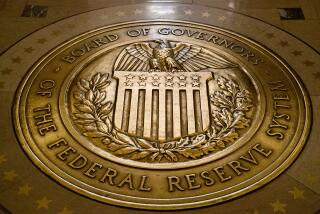Greenspan Gets a Second Term as Fed Chairman : Economy: President Bush gives the monetary policy-maker, with whom he had been at odds over interest rates, a surprisingly strong endorsement.
- Share via
WASHINGTON — President Bush said Wednesday that he will reappoint Alan Greenspan to a second term as chairman of the Federal Reserve Board, despite intense criticism that the White House leveled against him throughout the recent recession for refusing to lower interest rates more rapidly.
At a White House press conference, Bush gave Greenspan a surprisingly strong endorsement for his Fed performance and denied that Greenspan’s job as America’s chief central banker was ever in jeopardy. In fact, Administration sources said Wednesday, no other candidates were seriously considered by the White House.
“He (Greenspan) has done an outstanding job,” Bush said. He added that his decision to reappoint Greenspan to a second four-year term “should be a reassuring signal not only to domestic (financial) markets but to world markets, because of the respect level he has.”
Bush’s announcement came just hours after a final decision to reappoint Greenspan was made. It followed an afternoon White House meeting between the two in which the President formally offered him another term, sources said. The appointment is subject to Senate confirmation.
Greenspan, a 65-year-old bachelor, was appointed Fed chairman by former President Ronald Reagan in August, 1987. His term expires Aug. 11. Senior Bush Administration officials said nearly two weeks ago that Bush was virtually certain to reappoint him, but critics charged that the Administration was delaying the official announcement in an effort to pressure Greenspan to lower interest rates to boost the economy.
In fact, senior Administration officials, including White House Chief of Staff John H. Sununu, Treasury Secretary Nicholas F. Brady, Office of Management and Budget Director Richard G. Darman and White House economic adviser Michael J. Boskin, did not even meet to begin discussions on Greenspan’s reappointment until June 28.
Although the Fed has moved several times during the past year to cut rates, Greenspan’s critics within the Administration, most notably Brady, have argued that the central bank has been responsible for prolonging the recession by refusing to cut rates more aggressively. The dispute between the Administration and the Fed reached a climax when Bush insisted in his State of the Union address in January that interest rates should be lower--”now.”
Some senior officials, including Brady and Boskin, have argued publicly that the Fed’s restrictive rate policies played at least as big a role in bringing on an economic slump as did the oil crunch precipitated by the Persian Gulf crisis. The Fed, concerned about rising inflation, had begun to put the brakes on monetary policy long before the economy slid into recession, Greenspan’s critics argue.
Bush’s decision to reappoint Greenspan--coming just one week after Fed policy-makers decided in a closed-door meeting not to lower interest rates again any time soon--was made easier by the fact that the economy is gradually pulling out of the slump that began last summer.
In fact, Greenspan repeated Wednesday his belief that the recovery has begun. “I think the evidence is increasing week by week that the bottom is past and the economy is beginning to move up,” he told reporters. “We still do not yet know how rapid the recovery is or the underlying strength of it, but I think it’s a pretty safe bet at this stage to conclude that the decline is behind us and the outlook is continuing to improve.”
Bush insisted Wednesday that the recovery did not play a part in his decision. “No, his job wasn’t in jeopardy,” he said. “The Fed is an independent, sometimes very independent organization over there, and he’s (Greenspan’s) got to lead that important enterprise the way he sees fit.”
Yet senior Administration officials have acknowledged in recent days that the White House might have begun a more serious search for alternative candidates if the economy had remained mired in a deep recession.
Some of Greenspan’s critics within the Administration had even briefly floated the names of alternative candidates, including Gerald Corrigan, the President of the Federal Reserve Bank of New York and a close ally of former Fed Chairman Paul A. Volcker, and Martin Feldstein, a Harvard economist and a former White House economic adviser during the Reagan Administration--who was also an economic adviser on Bush’s first presidential campaign in 1980.
More to Read
Get the L.A. Times Politics newsletter
Deeply reported insights into legislation, politics and policy from Sacramento, Washington and beyond. In your inbox twice per week.
You may occasionally receive promotional content from the Los Angeles Times.








